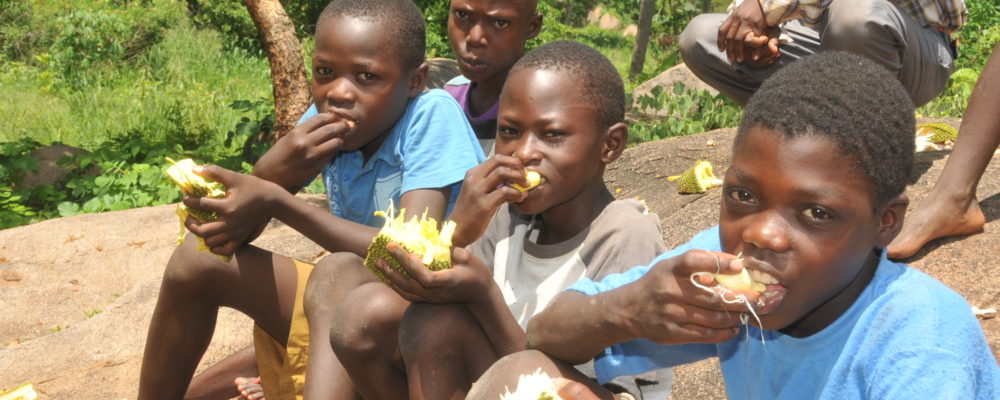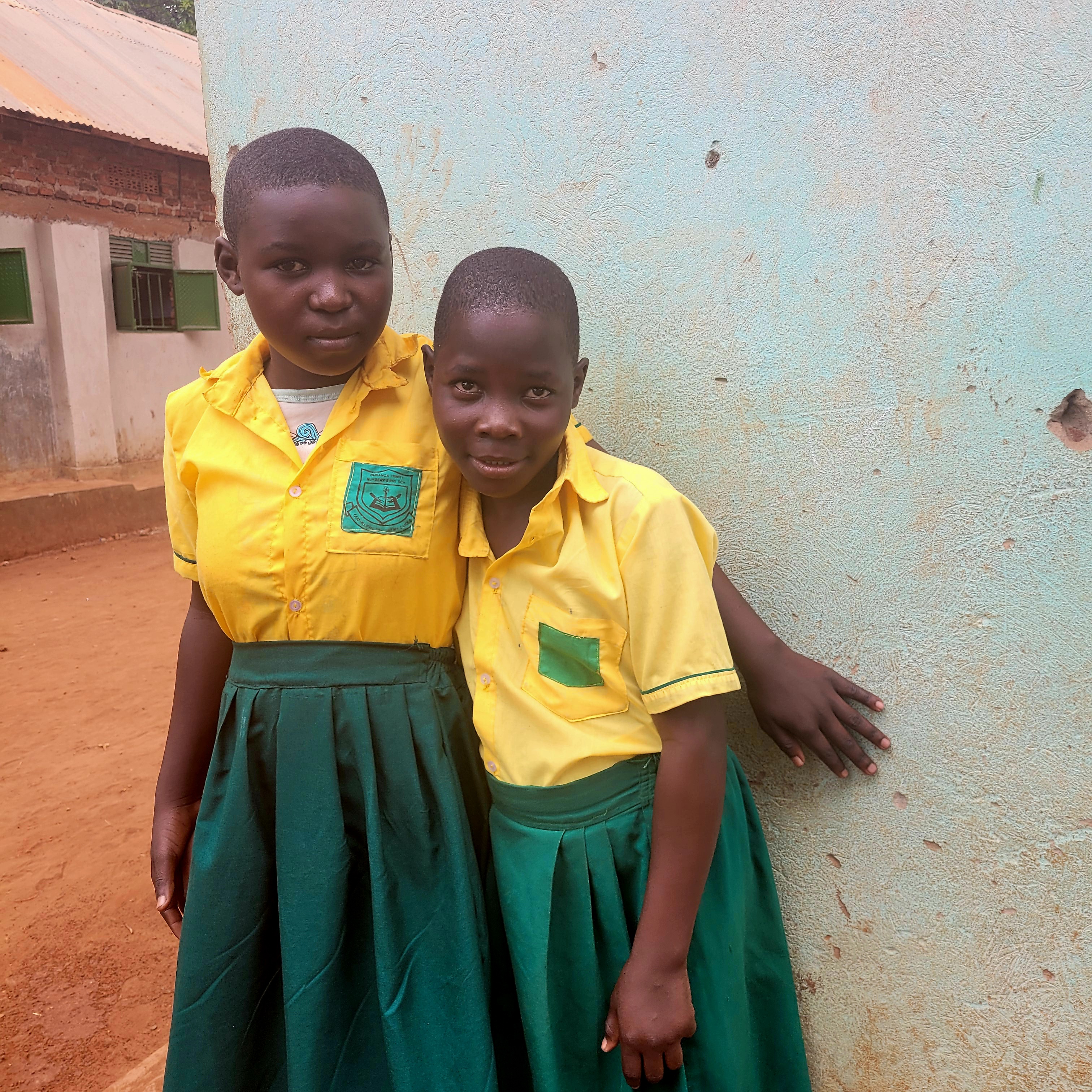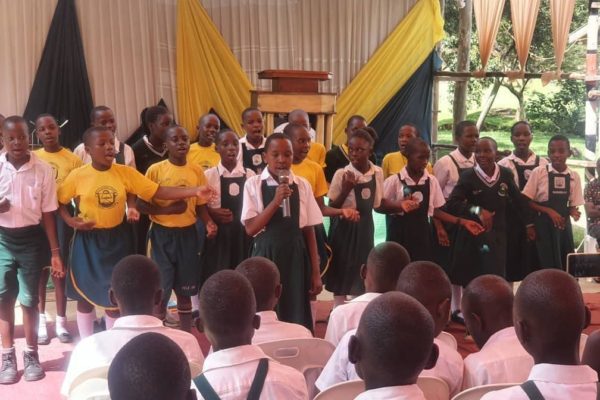ITS 1:00pm on a hot Thursday of April 20th, 2017 with the sun above in the skies casting its heat down on earth, as I am on my way to visit Harriet Gemakwoyo’s home at Kamwirungu village in Bulongo sub county for an interview about food shortage challenges, my eyes gaze at pupils of Kamwirungu Primary School feeding on raw mangoes along the way.
I became inquisitive in my mind as to why pupils are feeding on raw mangoes got from mango trees within the vicinity of the school, at lunch hour time.

So, I stop the boda boda rider and head towards the pupils to ask them why they were eating raw mangoes at lunch time instead of food, but surprisingly they reply in low tone voices that their parents do not provide for food for them at school due to abject poverty in their homes.
Many of the school going children in Luuka district go to attend school without having breakfast as they live their homes.
Meanwhile I proceed to Gemakwoyo’s home with the same boda boda motorcycle for the interview and on arrival, I find her in rugged clothes after attending to her garden, preparing a single day’s meal for her family.
Harriet Gemakwoyo is a mother of five children but looks after other four orphans who lost both parents in 2008 and faces a challenge of food shortage in her home.

After providing me with a chair under a mango tree just in front of her house, Gemakwoyo starts explaining to me during the 30 minutes interview about the food shortage challenges she faces in her home.
Clad in a black skirt dotted with big yellow flowers and grey blouse with a head gear, Gemakwoyo narrates that the long dry spell and lack of rains have caused severe food shortage in the district and the situation is appalling in many homes.
She adds that many of the families, including hers cannot afford two meals a day but instead prepare one meal that is served to children and eaten between 4 to 5pm.
“I woke up today (April 20th) at about 6:00am, greeted my husband, washed my face and got my hoe and headed for the garden which is a mile away, with my children,” Gemakwoyo notes.
She adds that she has a maize garden but all the maize like others in other gardens was affected by the fall army worm causing famine in most of the homesteads.
Gemakwoyo said her children and herself eat raw mangoes for breakfast as they wait for a huge meal always eaten at 4:00pm.
“You found me preparing to start mingling 2 kilograms of Chada (cassava flour) and also cook Ddodo vegetables as source for my family. I have already plucked Ddodo from the backyard which I will cook,” she states.
While scratching her left cheek with her fingers, Gemakwoyo says she starts cooking at about 3:00pm daily and eats late lunch at about 4:30pm or 5:00pm daily.
After the meal, Gemakwoyo with her children go and dig up Ant hills in search for termites which they feed to their chicken and later sleep by 8:00pm.
Despite facing food shortage challenges, Gemakwoyo appreciates non-profit community based organizations like Hope for Orphans Organization-Luuka that sometimes distribute relief food to orphans and other vulnerable children in Luuka.
Provision of Food by Parents:
Stephen Mwima, the deputy headmaster of Kamwirungu Primary School in Bulongo Sub County in Luuka district says few children feed at schools adding that parents no longer provide maize to feed their children while at school.
“At Kamwirungu Primary School, a government aided school, each pupil is supposed to bring 3 kilograms of maize for porridge but at many times when we contact parents to bring the maize, they tell us that they do not have it,” Mwima explains.

He says the school’s enrollment is currently at 1140 but less than 30 pupils feed at school adding that at many times they have tried to send them back home but no response from parents.
“In first term we collected less than 90 kilograms of maize and it was consumed in a period of two weeks and pupils resorted to eating raw mangoes during lunch time plus drinking water from a borehole within the school compound,” Mwima says.
He says that daily meals are prepared for teachers at the school but children gather around the kitchen gazing at cooks as they serve teachers food or gaze at their teachers as they eat food at lunch time with anticipation that any teacher can leave some food on the plate and calls one of them to eat it.
Mwima says that due to feeding challenges, the school management was forced to cut off evening classes and to also shorten the time at which the pupils leave school from 5:30pm to 4:00pm.
“Children come and attend classes on empty stomachs but most of them start dozing off as early as 9:00am and this has affected their performance in classes,” Mwima notes.
Mwima calls upon government to support or distribute food items to its schools under the Universal Primary Education (UPE) program.
He says if government does not respond, most districts including Luuka will experience poor grades in Primary Leaving Examinations (PLE).
Stephen Nsubuga Bewayo, the Resident District Commissioner says the challenge of food shortage has caused children in most schools in Luuka district not to turn up for school since parents are not providing food.
“Some children resort to cutting sugarcane to get money and give their parents to buy food at home and others eat mangoes during day,” Bewayo says.
Bewayo called upon government to come to the district’s rescue and distribute food to its schools in Luuka. He also calls upon good Samaritans to donate food items to vulnerable children.
“I visited Nabitaama Primary School in Bulongo sub county and out of 610 pupils, only 30 were feeding at school,” Bewayo revealed.

He adds that if parents do not feed their children, the academic performance in the district will be affected.
Bewayo also called upon non-government organizations through the Public Private partnerships to distribute relief food in schools as a way of supporting government and further commended Hope for Orphans Organization-Luuka, a non-profit organization in Luuka for distributing relief food to needy families in the district.

Bewayo says the majority of Ugandans in most districts across the country are surviving on one meal or half a meal a day. –End-





